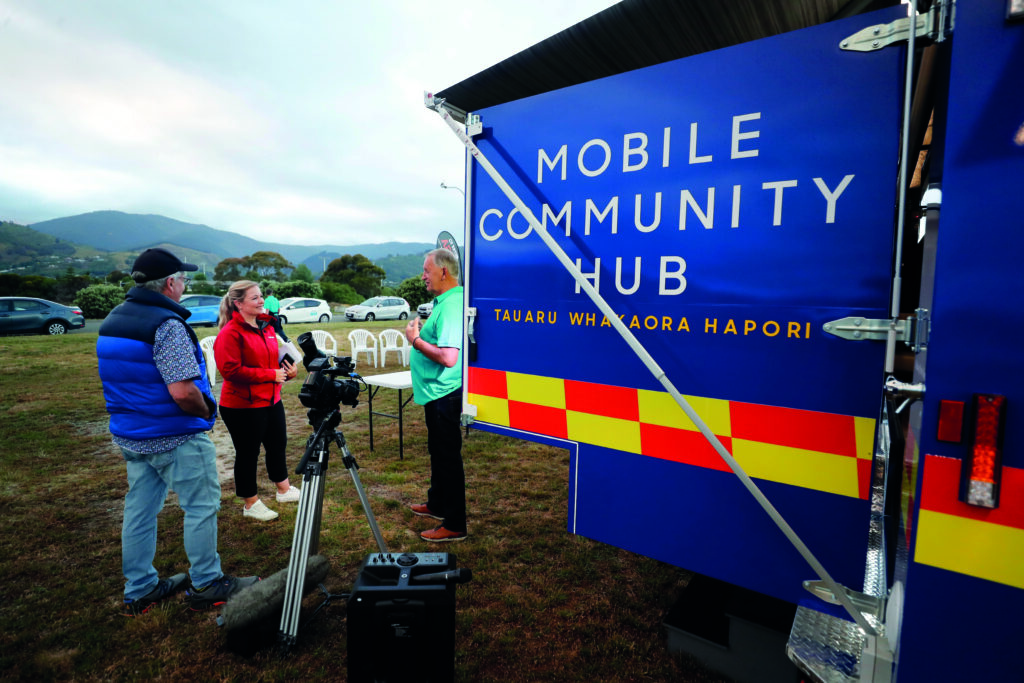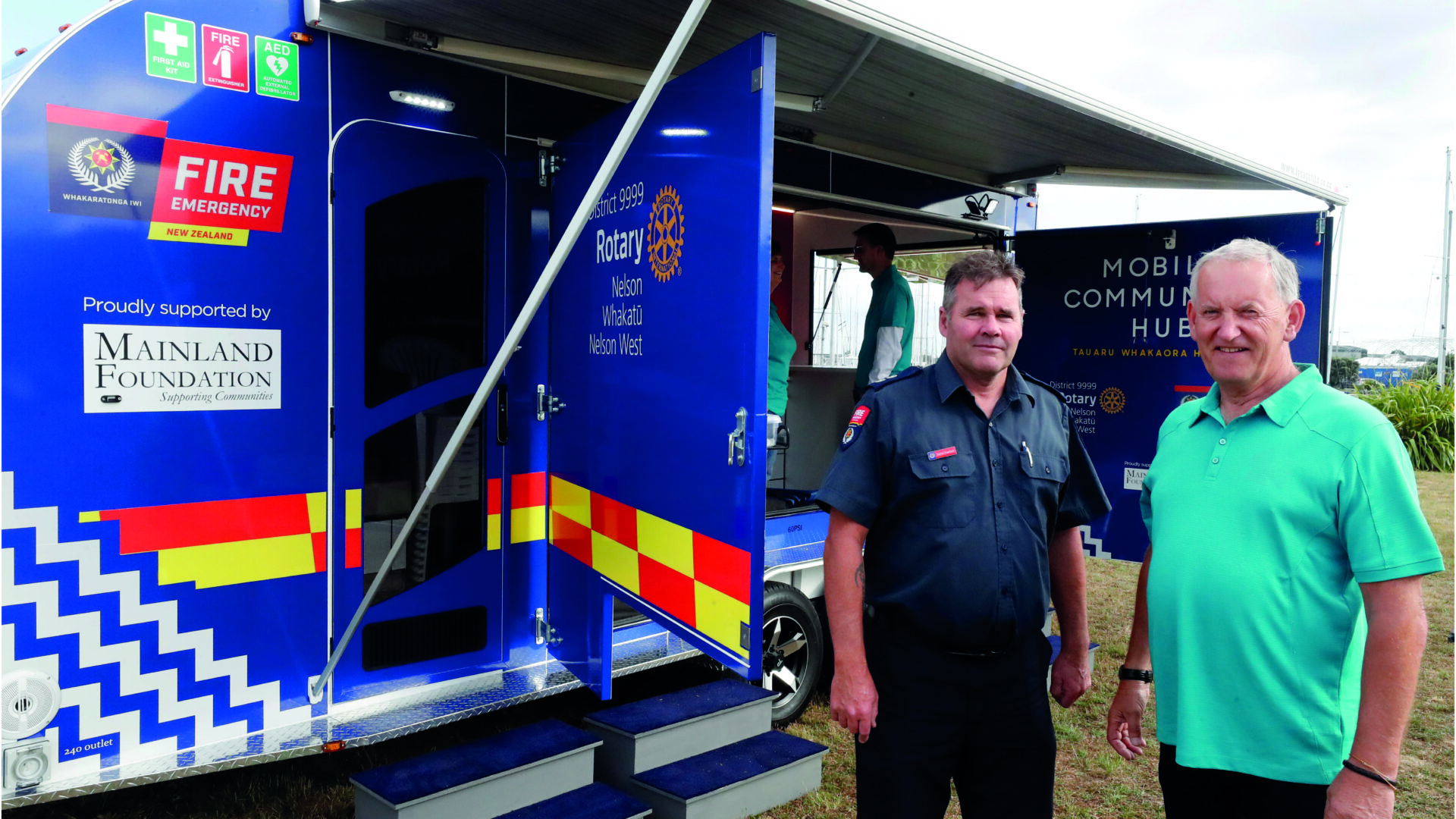By Karen Stade
Rotary Club of Whakatū, NZ
Assistant Governor D9999
A community mobile hub caravan gifted to Fire and Emergency NZ by Rotary will play an important role in the ability of New Zealand’s Nelson community to respond, recover and develop resilience to natural disasters and fires.
Led by the Rotary Club of Whakatū, the $132,000 purpose-built and fitted 5.5m-long caravan is the first of a planned series of mobile community hubs being funded by nine Rotary clubs and several community funding agencies for placement across the four regions that make up the top of the South Island: Nelson, Tasman, Marlborough, Buller, and also the West Coast.
Project Manager Trevor Marshall, of the Rotary Club of Whakatū, was inspired after a talk to the club by Fire and Emergency NZ (FENZ) District Manager Grant Hayward and Senior Advisor Community Readiness and Recovery Darren Crawford over a year ago. A prototype mobile community hub caravan built for FENZ in Christchurch had proved its worth in Nelson during the flooding and landslips of August 2022 and it was suggested the club might like to help get something similar for the city.
Such was the interest from other Rotary clubs that the project grew to encompass a number of caravans spanning the wider top of the South Island region.

PICTURE: The launch of the first mobile community hub caravan attracted widespread attention, including newspaper and national television coverage, the attendance of Nelson MP Rachel Boyack, Nelson Mayor Nick Smith and Tasman District Deputy Mayor Stuart Bryant, along with representatives of various emergency service organisations.
Trevor said a range of natural disasters, including fires, floods, landslides and earthquakes, had hit the top of the South and West Coast over the past 10 years. Many of those caught up in the immediate emergencies found they had limited access to live information about what was happening and where they could get help, and much of the area’s geography meant small communities were cut off for days at a time.
“While emergency crews are dealing with the situation at hand, they can’t be helping the people directly affected by it at the time. These mobile community hub caravans can be quickly deployed by the FENZ community teams as a haven and a base for people to gather at, find guidance and support, and get up to date information,” Trevor said.
The caravans are designed to bridge the gap between the developing emergency and the arrival of other support agencies and local and central government assistance. They are completely self-sufficient, with a basic kitchen and built-in barbecue at one end, which can dispense a hot drink and food, while a self-contained meeting room at the other end can be used for support services for traumatised victims, as well as provide a base for councils and government agencies to offer information and support where needed. A pair of large side doors open to provide a platform from which a TV screen can be seen, perhaps showing live information from agencies such as Civil Defence.
While they can be hooked up to the national grid, the caravans can also function with no power. They are fitted with roof-top solar panels, portable generators, gas for cooking, and fresh and grey water tanks. They also contain a defibrillator, first aid kit and fire extinguisher, and have a charging station for technology like mobile phones, as well as the ability to hook into WiFi. Each caravan has a pull-out veranda and a separate gazebo with tables and chairs to provide extra space for people to gather in
all weather.
Outside of emergencies, the caravan will be used by FENZ community teams for fire and emergency safety education, and Rotary clubs will have access to them for community events and projects.
“In any emergency or natural disaster, the caravan’s eye-catching sign wrapping, including a large Rotary logo, will advertise to everyone that this is where you come for support,” Trevor said.
The first caravan off the production line was launched with a dawn blessing and cooked breakfast in Nelson in December 2023, with the support of the Rotary clubs of Whakatū, Nelson and Nelson West. The project was supported with a district grant from District 9999 and considerable sponsorship from the Mainland Foundation. The unit is stationed at the Nelson City fire station.
FENZ district manager Grant Hayward paid tribute to Rotary and Trevor’s vision, saying that when he first met to discuss the idea of a mobile community hub caravan for the city, he never dreamed Trevor would pull it off, let alone extend the project to more than one caravan.
The launch of the first mobile community hub caravan attracted widespread attention, including newspaper and national television coverage, the attendance of Nelson MP Rachel Boyack, Nelson Mayor Nick Smith and Tasman District Deputy Mayor Stuart Bryant, along with representatives of various emergency service organisations.
The next two caravans are now in the pipeline and will be based in Tasman and Marlborough, with the support of the Rotary Clubs of Richmond, Motueka, Blenheim and Blenheim South. It is then hoped others can be placed on the West Coast, one in Greymouth and the other in Westport, with the support of the region’s two Rotary clubs.
Interest in securing more mobile community hub caravans has also been expressed by a number of Rotary clubs in other parts of the South Island and one will be on display and promoted at the District 9999 Conference in Christchurch this April.
MAIN PICTURE: Emergency NZ’s Senior Advisor Community Readiness and Recovery Darren Crawford, left, and Rotary Club of Whakatū’s Project Manager Trevor Marshall at the launch of the first community mobile hub caravan in December 2023.
